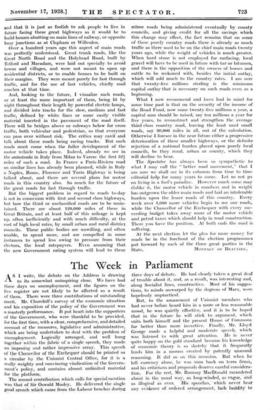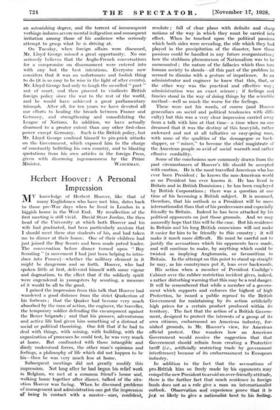The Week in Parliament A S I write, the debate on
the Address is drawing to its somewhat uninspiring close. We have had three days on unemployment, and the figures on the live register are not likely to be affected as a result of them. There were three contributions of outstanding merit. Mr. Churchill's survey of the economic situation and his exposition of the policy of the Government was a masterly performance. It put heart into the supporters of the Government, who were thankful to be provided, for the first time, with a clear, comprehensive, and detailed account of the measures, legislative and administrative, which are being undertaken to deal with the problem of unemployment. Logically arranged, and well hung together within the fabric of a single speech, they made an imposing and rather impressive array. This speech of the Chancellor of the Exchequer should be printed as a circular by the Unionist Central Office, for it is a really weighty and convincing vindication of the Govern- ment's policy, and contains almost unlimited material for the platform. The second contribution which calls for special mention was that of Sir Oswald Mosley. He delivered. the single good speech which came from the Labour benches during three days of debate. He had clearly taken a great deal of trouble about it, and, as a result, was interesting and, along Socialist lines, constructive. Most of his sugges-. tions, to minds unwarped by the dogmas of Marx, were hopelessly unpractical.
But, to the amazement of Unionist members who had never before heard him in a more or less reasonable mood, he was quietly effective, and it is to be hoped that in the future he will Stick to argument, which suits both himself and the present House of Commons far better than mere invective. Finally, Mr. Lloyd George made a helpful and moderate speech, which was listened to with great attention. lie is never quite happy on the gold standard because his knowledge' of economic theory is so sketchy that it frequently lands him in a morass created- by patently unsound reasoning. rt did so on this occasion. But when he left. currency alone, he was soon back on terra &Mit, and his criticisms and proposali deierve careful Consider. a- tion. For the rest, Mr. Ramsay MacDonald meandered abOut in the usual way, as long-winded,' as Vague, and" as illogical *as ever. His speeches, which never bear any evidence of Ordered arrangement, lack' lucidity to an astonishing degree, and the torrent of inconsequent verbiage induces severe mental indigestion and consequent irritation among those of his audience who seriously attempt to grasp what he is driving at.
On Tuesday, when foreign affairs were discussed, Mr. Lloyd George missed a great opportunity. No one seriously believes that the Anglo-French conversations for a compromise on disarmament were entered into with any but the best intentions. Everyone now considers that it was an unfortunate and foolish thing to do (it is so easy to be wise in the light of after events). Mr. Lloyd George had only to laugh the so-called " pact " out of court, and then proceed to vindicate British foreign policy since the war to the rest of the world, and he would have achieved a great parliamentary triumph. After all, for ten years we have devoted all our efforts to healing the breach between France and Germany, and strengthening and consolidating the League of Nations. In addition, we have actually disarmed to a greater extent than any other first-class power except Germany. Such is the British policy, but Mr. Lloyd George confined himself to pin-prick attacks on the Government, which exposed him to the charge of constantly belittling his own country, and to blasting quotations from his own articles in the foreign Press, given with disarming ingenuousness by • the Prime







































 Previous page
Previous page